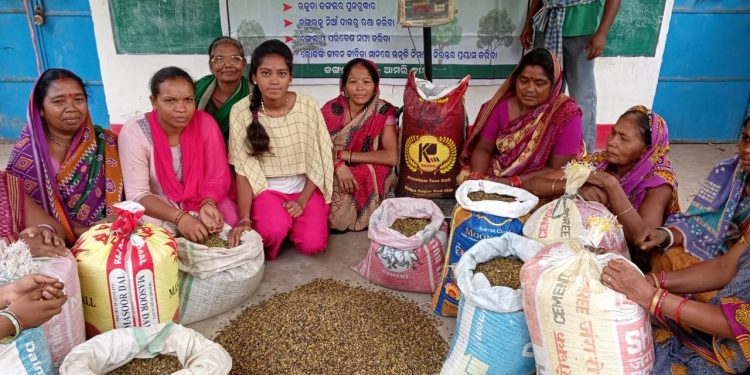Sundargarh: Collection and sale of forest produce in tribal areas of the Sundargarh district is the main source of livelihood for people after agriculture. The poor and tribal traditional forest dwellers have been collecting varieties of produce like mohua flowers and seeds, Sal seeds, kendu leaf, and bhuin neem for a long period and managing their livelihood by selling these products. Earlier due to a lack of proper marketing facilities, these people, however, failed to get sufficient monetary benefits. Sources pointed out that due to an excessive intervention of middlemen in villages, primary collectors and traditional forest dwellers were being forced to sell the forest produce at rates below the minimum support price (MSP).
However, now the second phase of the Odisha Forestry Sector Development Project (OFSDP-II) has created a new ray of hope for these tribals. After the end of the mohua flower season, people usually have no other means of livelihood. The collection of Sal seeds (Shorea Robusta) is the lifeline for tribal and forest dwellers. Every year in April and May, Sal seeds ripen and fall. Earlier local traders and middlemen took advantage of the ignorance of the tribal collectors and fleeced them by buying the seeds at very low rates. Hence the primary collectors slowly lost interest in the collection of Sal seeds as they were not getting the right price for their labour. Trading of Sal seeds was launched by the Van Surakhya Samities (VSS) through OFSDP-II in Sundargarh forest division when thousands of families lost their livelihoods during the Covid-19 pandemic in 2020-21.
At that time, many families managed to earn their livelihood by selling 2,600 quintals of Sal seeds at Rs 20 per kg to the Tribal Development Cooperative Corporation (TDCC). This year, from the start of the Sal seed season, a large amount of the produce has been collected by motivating the primary collectors under each VSS level in Ujalpur, Lephripara, Hemgir, Sundargarh and Bargaon field management units of Sundargarh forest division. This has helped in reducing the unnecessary intervention of middlemen and agents while the primary collectors are benefitting as the money is directly being transferred to their bank accounts. The success achieved by the members of Sagarpali Vana Surakshya Samiti in Ujalpur is a case at this point.
A total of 1,668 families of 44 VSSs have so far sold 8291.31 quintals of Sal seeds with the continuous efforts and awareness of the members of partner organisation ‘Sewak’ and with the cooperation of the staff of the divisional and field management units. With a total cost of more than Rs 1.65 crore as its MSP, it can contribute to the economic growth of many poor tribal people and forest dwellers. When contacted, Gopal Chandra Shukla, an expert of OFSDP-II under the Sundargarh divisional management unit informed us there has been a bumper collection and more than 2,000 quintals of sal seeds are available at the VSS level for sale.






































